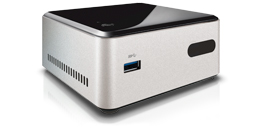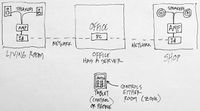Id
Contents
What is an Id?
The JRiver Id (rhymes with hid) is a network media player. It plays high quality audio from a computer. It is controlled with a smartphone, using Gizmo (for Android) or JRemote (for iOS).
Imagine a few of these around your home. You can play to the Id from a computer or use the Id stand-alone.
At $395, it's also affordable.
Intel Hardware
The Id is based on the Intel NUC. It's small (4"x4.5"x2"). It's low power, cool, and quiet.
JRiver Software
The Id is powered by JRiver Media Center. JRiver MC can update itself automatically.
Connects to Existing Audio Equipment
The Id can use the speakers of any amplifier or TV that has HDMI ports, or RCA jacks (with an 1/8" stereo to RCA adaptor).
The Id also works with most USB DAC's. Audioquest's Dragonfly is supported, for example.
To play to or from the Id, you will need software that supports DLNA or UPnP. JRiver Media Center does this on Mac or Windows or Linux.
Details
The Id is a:
DLNA Renderer -- When connected to an amplifier or DAC, you can play to it from any DLNA Server.
DLNA Server -- It can host your files and serve them to any DLNA Renderer.
Portable Media Player -- Wherever there is an electrical outlet, the Id can stand alone, and play to an audio amplifier or compatible DAC. It has a 120GB SSD drive. The software takes about 20GB, so you have 100GB of storage (about 300 CD's at lossless quality). It runs a Samba Server, so you can copy files to it from a PC or Mac. Connect a USB keyboard, USB mouse, and HDMI display, or just run it with a smart phone, and no peripherals.
Audio output via HDMI, 1/8" Stereo analog, or USB. The Id uses the speakers of any amplifier or TV.
- 2GB of RAM and a 120GB SSD drive.
- Intel Celeron CPU
- USB (3.0 (1) and 2.0 (2))
- Wired and wireless Ethernet
- IR, Bluetooth and WiDi. (Bluetooth, and WiDi are not yet supported.)
More about the NUC at Intel.
More about DLNA

